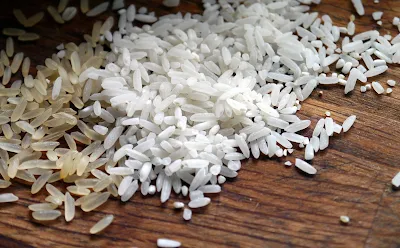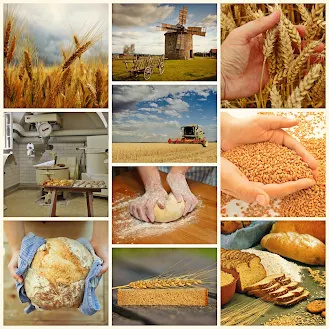Abiotic Stress Management by stress-tolerant crop varieties
In
the last blog, I explained the approaches to abiotic stress management in
agriculture. In this blog, we are going to see How Abiotic stress-tolerant crop
varieties are important in the Battle against climate change. Abiotic
stress-tolerant crop varieties play a crucial role in managing abiotic stress
in agriculture. Abiotic stresses are non-living factors such as drought, heat,
salinity, cold, flooding, and nutrient deficiency that can negatively impact
plant growth and productivity. Developing crop varieties that can withstand and
thrive under these challenging conditions is essential for ensuring food
security and sustainable agricultural practices. For the last few decades,
agricultural scientists are engaged develop crop varieties that can sustain
different stress conditions.
Here
are a few reasons why abiotic stress-tolerant crop varieties are important in
Agriculture:
Improved
crop productivity: Abiotic stress can
drastically reduce crop yields. By developing varieties that are tolerant to
specific stress factors, such as drought or salinity, farmers can confirm more
stable and consistent yields even in harsh environmental conditions. This helps
to protect food production and decrease the economic losses caused by crop
failures.
Resource
optimization: Abiotic stress-tolerant crops are
better adapted to consume limited resources proficiently. For example, drought-tolerant
varieties have mechanisms to preserve water and sustain growth even with
reduced water availability. This enables farmers to use water resources more
efficiently and mitigate the impact of water scarcity on agricultural
production.
Some
of the drought-tolerant crop varieties are
Rice:
Sahbhagi Dhan, Swarna Purvi Dhan 1, Swarna Purvi Dhan 2, Swarna Shusk Dhan , Swarna-Submerged, DRR-Dhan 42, Sahbhagi Dhan, Samba
Mahsuri.
Wheat:
K 1008, DWR 162, DWR 195, HD 2967, GW 322, WH 1105.
Millets:
Co 5, Co 6 (Foxtail millet), Co 9 (Kodo millet), Co 13 (Little millet), Co 14
(Barnyard millet).
Maize:
Ganga-5, Ganga Safed-2, HQPM-1, HQPM-7, Dhanshakti, Ganga-5, NK 6240.
Sorghum:
CSV 23F, CSV 27F, CSV 29F, CSV 30F, CSV 31F, M 35-1.
Chickpea:
ICCV 10, JAKI 9218, KAK 2, JG 11, RSG 934, RSG 888.
Pigeonpea:
ICPL 151, ICPL 88039, ICPL 85063, Asha, Bahar, UPAS 120.
Green gram (Moong):
Pant Moong 1, Pant Moong 2, T 44, PDM 139, Pusa Vishal, GGM 4.
Black gram (Urad):
Pant Urd 31, Pant Urd 32, Pant Urd 33, Pant Urd 34, Pant Urd 35, PU 31.
Mustard:
RH 0747, Varuna, Pusa Mustard-30, RH 749.
Groundnut:
GG 2, GG 4, GG 5, GG 7, GG 10, TMV 2, TG 26.
Sesame:
RTM 2067, VRI 1, GT 10, TKG 22, GT 11, TKG 22.
Sunflower:
Morden, PSF 22, PSF 27, PSF 8, PSF 25, MSFH 8H.
Expansion
of arable land: Abiotic stress-tolerant crops can
open up new possibilities for agriculture in areas that were formerly incompatible
with farming. For instance, salt-tolerant varieties allow farmers to grow crops
in saline soils, which were previously unproductive. This helps to increase the
overall arable land area and enhances agricultural productivity.
Some
of the Salt-tolerant crop varieties are:
Rice: Pokkali,
Nonabokra, Lunishree, Sarbati
Wheat: KRL-1,
KRL-19, KRL-210
Mustard: Pant
Ruchi, CS 52, Varuna
Green gram (Mung bean): Pusa
Vishal
Black gram (Urad bean): Pant
Urd 31
Tomato:
Pusa Early Dwarf
Okra (Lady's finger):
Arka Anamika
Spinach:
Pusa Jyoti
Watermelon: Amar
Climate
change adaptation: With climate change,
the frequency and intensity of abiotic stresses are expected to increase. By
developing stress-tolerant crop varieties, farmers can adapt to changing
climatic conditions and minimize the adverse impacts on agricultural
production. These varieties can survive extreme temperatures, rainfall
fluctuations, and other climate-related challenges.
Some of the High temperature-tolerant crop
varieties are
Wheat: HD
2967, K7903
Rice: Sahbhagi
Dhan, Pusa Basmati 1121
Maize: HQPM
1, DHM 117
Tomato: Arka Vikas, F1 Hybrid Arka Abha
Reduced
environmental impact: Abiotic
stress-tolerant crops often require fewer inputs such as water, fertilizers,
and pesticides. This can lead to reduced environmental pollution and a more
sustainable agricultural system. Additionally, by preventing crop failures due
to abiotic stress, farmers can minimize the need for land expansion and the
associated deforestation, protecting natural habitats.
Overall,
abiotic stress-tolerant crop varieties are vital for managing abiotic stress in
agriculture. They provide a resilient and sustainable approach to ensure food
security, optimize resource use, adapt to climate change, and minimize
environmental impacts. Ongoing research and development efforts are focused on
identifying and breeding stress-tolerant varieties to address the diverse
challenges faced by farmers around the world. The examples of abiotic
stress-tolerant crop varieties I included in the blog are developed by
different Indian Research Institutes in India, but very few varieties are
available in the market for farmers. I hope in the next few years farmers get
these crop varieties and maintain food security for our upcoming generation.





